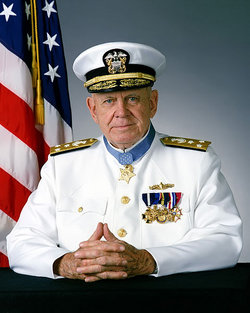Commanded Motor Torpedo Boat Squadron 3 (PT-41) during the evacuation of General MacArthur and his staff. Born on August 19, 1911 in Manhattan. From FIND A GRAVE:World War II Congressional Medal of Honor Recipient. He graduated from the United States Naval Academy in Annapolis, Maryland in 1933, and served on a number of United States Navy warships prior to World War II. While a Lieutenant Commander during the War, he commanded a Motor Torpedo Boat Squadron. He was awarded the CMOH for his bravery and service in various actions in the Philippine waters from December 7, 1941 (the day Pearl Harbor was bombed) to April 10, 1942. His citation reads “For extraordinary heroism, distinguished service, and conspicuous gallantry above and beyond the call of duty as commander of Motor Torpedo Boat Squadron 3. The remarkable achievement of Lt. Comdr. Bulkeley's command in damaging or destroying a notable number of Japanese enemy planes, surface combatant and merchant ships, and in dispersing landing parties and land-based enemy forces during the 4 months and 8 days of operation without benefit of repairs, overhaul, or maintenance facilities for his squadron, is believed to be without precedent in this type of warfare. His dynamic forcefulness and daring in offensive action, his brilliantly planned and skillfully executed attacks, supplemented by a unique resourcefulness and ingenuity, characterize him as an outstanding leader of men and a gallant and intrepid seaman. These qualities coupled with a complete disregard for his own personal safety reflect great credit upon him and the Naval Service”. Not mentioned in the citation is his accomplishment of March 11, 1942, when he rescued and removed General Douglas MacArthur, his staff and his family from the threatened city of Manila in a daring night-time operation. He would go on to command PT boats in the July 1943 landings of Trobriand Islands, participate in the June 1944 D-Day landings, and command a Destroyer in the August 1944 Southern France landings of the United States 7th Army. In addition to the Medal of Honor, he was awarded the Navy Cross, the Distinguished Service Cross, the Silver Star, and France's Legion of Merit, making him one of the most decorated officers in United States Naval history. After the War he served in the Navy until 1988, retiring with the rank of Vice-Admiral, and having commanded the Guantanemo Base in Cuba during the early 1960’s conflicts. His exploits in the Philippines were detailed in the John Ford movie “They Were Expendable”. In 2001, an United States Navy Arleigh Burke-class Guided Missile Destroyer, the “USS Bulkeley” (DDG-51) was commissioned and named in his honor.

PRIVATE CITIZENS SUPPORTING AMERICA'S HERITAGE
American
War Memorials Overseas, Inc.
War Memorials Overseas, Inc.
Bulkeley John Duncan
Name:
John Duncan Bulkeley
Rank:
Vice Admiral
Serial Number:
Unit:
Date of Death:
1996-04-06
State:
New York
Cemetery:
Arlington National Cemetery Arlington, Arlington County, Virginia
Plot:
Section 5, Grave 129-9
Row:
Grave:
Decoration:
Medal of Honor, Navy Cross, Distinguished Service Cross, Sil
Comments:
